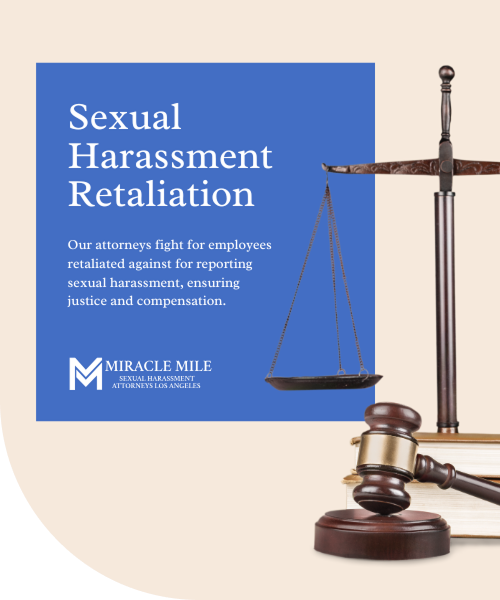Retaliation for Reporting Sexual Harassment
Employees who report sexual harassment in the workplace are legally protected from retaliation. However, many employers still punish workers for speaking out by reducing hours, demoting them, or even terminating their employment. If you have experienced retaliation after filing a sexual harassment complaint, you may have grounds for legal action. Miracle Mile Law Group fights for employees in Los Angeles who have been wrongfully punished for asserting their rights.
Understanding Your Case
- What Constitutes Retaliation at Work for Filing a Sexual Harassment Complaint in Los Angeles?
- Retaliation for a Complaint of Sexual Harassment in Los Angeles
- What to Do If You Are Experiencing Retaliation in Los Angeles
- Laws Against Sexual Harassment and Retaliation
- Common Forms of Retaliation and Subtle Retaliation
- Workers Rights Against Workplace Retaliation in Los Angeles
- Contact Miracle Mile Law Group if You Have Experienced Retaliation

Miracle Mile Law Group Los Angeles Retaliation Sexual Harassment Attorney: Caitlyn Handy, Esq.
“No employee should suffer retaliation for speaking out against sexual harassment. We fight to protect workers’ rights and hold employers accountable for unlawful retaliation.”
What Constitutes Retaliation at Work for Filing a Sexual Harassment Complaint in Los Angeles?
Retaliation occurs when an employer punishes an employee for reporting workplace misconduct, such as sexual harassment, discrimination, or unlawful behavior. Under California and federal law, retaliation is illegal, and employees who experience it have the right to take legal action.
Retaliation can take many forms, ranging from obvious punishment, like termination, to more subtle forms of mistreatment, such as isolation, exclusion from projects, or sudden negative performance reviews. Employers may attempt to disguise retaliation as a legitimate business decision, but if an employee can prove that their employer’s actions were motivated by their complaint, they may have a strong legal case.
How to Prove Retaliation in the Workplace
For an employee to successfully claim retaliation, they must demonstrate the following key elements:
- Engagement in a Protected Activity: The employee must show that they engaged in a legally protected activity, such as:
- Filing a sexual harassment complaint with HR, the CRD, or the EEOC.
- Reporting inappropriate behavior or misconduct to a supervisor or employer.
- Participating in an investigation regarding sexual harassment or workplace violations.
- Supporting a coworker’s harassment complaint as a witness.
- Adverse Employment Action: The employer must have taken a negative action against the employee after they engaged in the protected activity. Examples include:
- Termination – The employee is fired after filing a complaint.
- Demotion or Pay Reduction – The employer cuts the employee’s salary or rank.
- Unjustified Negative Performance Reviews – The employee suddenly receives poor evaluations despite prior good performance.
- Increased Scrutiny or Harassment – The employer or coworkers begin targeting the employee, micromanaging, or creating a hostile environment.
- Isolation or Exclusion – The employee is left out of meetings, projects, or workplace events.
- Causal Connection Between the Complaint and the Retaliation: The employee must prove that the employer’s negative actions were directly linked to their complaint. Some ways to establish this connection include:
- Timing: If the employer took action against the employee shortly after the complaint was filed, this may indicate retaliation.
- Inconsistent Justifications: If the employer changes their reasoning for firing or demoting an employee, this could suggest retaliation.
- Differential Treatment: If other employees in similar situations were not punished but the complainant was, it strengthens a retaliation claim.
Compensation for Victims of Retaliation
If your employer has retaliated against you for reporting sexual harassment, you may be entitled to financial compensation and other legal remedies, including:
- Back Pay: Compensation for lost wages and benefits due to termination or demotion.
- Front Pay: Future earnings if reinstatement is not possible.
- Emotional Distress Damages: Compensation for anxiety, depression, or emotional suffering caused by retaliation.
- Punitive Damages: If the employer’s conduct was particularly egregious, the court may award additional damages as a penalty.
- Reinstatement: In some cases, the court may order the employer to reinstate the employee to their previous position.
If you suspect you are being retaliated against, it is crucial to document everything and seek legal counsel as soon as possible. At Miracle Mile Law Group, our Los Angeles workplace retaliation attorneys fight to hold employers accountable and secure justice for employees who have suffered retaliation. Contact us today for a free consultation to discuss your legal options.
Retaliation for a Complaint of Sexual Harassment in Los Angeles
Retaliation after reporting sexual harassment can happen in different ways. Employers may take immediate action against an employee after a complaint, or they may slowly create a hostile work environment that forces the employee to leave.
Common signs of retaliation after filing a sexual harassment complaint include:
- Sudden negative performance reviews despite a history of strong work.
- Unwarranted disciplinary action or write-ups that never occurred before.
- Being excluded from meetings, projects, or work opportunities.
- Unjustified demotion, pay cuts, or reduced hours.
Increased scrutiny or micromanagement from supervisors. - Harassment or bullying from coworkers or management.
- Termination or forced resignation.
Retaliation is meant to intimidate and silence employees, discouraging them from asserting their rights. If you believe you are being targeted for speaking out, you should document everything and consult an attorney immediately.
What to Do If You Are Experiencing Retaliation in Los Angeles
If you believe your employer is retaliating against you after reporting sexual harassment, you should take immediate steps to protect yourself and strengthen your legal case.
Steps to Take if You Are Facing Retaliation:
- Document Everything: Keep detailed records of retaliatory actions, emails, performance evaluations, and workplace interactions. This evidence will help prove your case.
- Report the Retaliation to HR: If your employer has a formal complaint process, submit a written report of the retaliation and request a response in writing.
- Do Not Quit Right Away: Leaving your job may weaken your legal claim, so consult an attorney before making any employment decisions.
- Consult a Sexual Harassment and Retaliation Attorney: An experienced lawyer can evaluate your case, protect your rights, and help you take legal action against your employer.
- File a Legal Complaint: Employees experiencing retaliation can file a formal complaint with the California Civil Rights Department (CRD) or the Equal Employment Opportunity Commission (EEOC) before pursuing a lawsuit.
If you are experiencing retaliation at work, you may have a strong case against your employer and could be entitled to compensation.
Laws Against Sexual Harassment and Retaliation
Both California and federal laws protect employees from sexual harassment and retaliation for reporting misconduct.
California Laws Protecting Employees from Retaliation
- Fair Employment and Housing Act (FEHA): Prohibits retaliation against employees who report or oppose sexual harassment.
- California Whistleblower Protection Act: Protects workers from retaliation when reporting violations of law, including workplace harassment.
- Labor Code Section 1102.5: Protects employees from retaliation when disclosing unlawful employer conduct.
Federal Laws Protecting Employees from Retaliation
- Title VII of the Civil Rights Act of 1964: Makes it illegal for employers to retaliate against employees for reporting or opposing sexual harassment.
- Equal Employment Opportunity Commission (EEOC) Protections: Federal laws enforced by the EEOC prohibit retaliation against employees who file complaints or participate in investigations.
If your employer has violated these laws, you have legal grounds to sue for damages.
Common Forms of Retaliation and Subtle Retaliation
Retaliation does not always happen in obvious ways. Employers may engage in subtle retaliation to avoid legal consequences while still making the workplace unbearable for the employee.
Direct Forms of Retaliation:
- Termination or wrongful dismissal after reporting sexual harassment.
- Demotion or reduction in responsibilities without justification.
- Cutting wages, hours, or denying promotions to punish the employee.
- Publicly criticizing or embarrassing the employee to discourage future complaints.
Subtle Forms of Retaliation:
- Exclusion from meetings, projects, or workplace events.
- Changing work schedules or assignments to create difficulties.
- Negative performance reviews designed to justify future discipline.
- Coworkers being encouraged to ignore or mistreat the employee.
Even small changes in workplace treatment can be legally actionable if they are a direct response to an employee reporting sexual harassment.
Workers Rights Against Workplace Retaliation in Los Angeles
California has some of the strongest worker protections in the country against retaliation. Employees who report sexual harassment, discrimination, or other unlawful workplace conduct have the right to do so without fear of punishment or mistreatment. When an employer takes negative action against an employee for speaking out, it is illegal under both California and federal laws.
Retaliation can take many forms, including wrongful termination, demotion, reduced hours, workplace isolation, or harassment from management or coworkers. If you have experienced any form of retaliation, you may be entitled to legal protections and compensation.
Your Rights as an Employee in California:
- The right to report workplace misconduct: Employees have the right to file complaints about sexual harassment with Human Resources (HR), the California Civil Rights Department (CRD), or the Equal Employment Opportunity Commission (EEOC) without fear of punishment.
- The right to seek legal action: If you have been retaliated against, you have the right to pursue a lawsuit against your employer for violating your legal protections.
- The right to a safe work environment: Employers are required to address workplace complaints and take action to prevent further retaliation or harassment.
- The right to compensation for damages: If you have suffered financial or emotional harm due to retaliation, you may be entitled to compensation for:
- Lost wages and benefits from wrongful termination or demotion.
- Emotional distress damages for anxiety, depression, or other psychological effects.
- Punitive damages in cases of extreme employer misconduct.
How Employers Violate Workers’ Rights
Even though retaliation is illegal, many employers ignore the law and punish employees for speaking up. This may include:
- Threatening termination or job loss if an employee reports sexual harassment.
- Creating a hostile work environment by allowing mistreatment from managers or coworkers.
- Changing work schedules, assignments, or responsibilities to make the employee’s job more difficult.
- Withholding promotions or pay raises as punishment for filing a complaint.
Holding Employers Accountable for Retaliation
If your employer fails to protect your rights and retaliates against you for reporting sexual harassment, you have legal options to hold them accountable. At Miracle Mile Law Group, we help employees file legal claims, negotiate settlements, and take cases to court to ensure justice is served.
Contact Miracle Mile Law Group if You Have Experienced Retaliation
If you were punished, demoted, or fired after reporting sexual harassment, you do not have to face this alone. Retaliation is illegal, and you have the right to fight back.
At Miracle Mile Law Group, we:
- We represent employees, not employers.
- Hold companies accountable for retaliation and workplace harassment.
- Fight for maximum compensation, including lost wages, emotional distress, and punitive damages.
- Work on a contingency fee basis, meaning you pay nothing unless we win.
If you believe you have been retaliated against for speaking out, we can help you take legal action and protect your rights.
Contact Miracle Mile Law Group today for a free consultation.


Our attorneys represent employees who have experienced workplace sexual harassment, including unwanted advances, inappropriate conduct, and retaliation for reporting misconduct. We fight to hold employers accountable and secure justice for victims through legal action.

Quid pro quo harassment happens when a supervisor or employer demands sexual favors in exchange for job benefits like promotions or raises. It is an abuse of power and illegal under California and federal law. Employees who face retaliation for refusing advances have the right to take legal action.

A hostile work environment happens when repeated harassment creates an intimidating or offensive workplace. This includes inappropriate comments, unwanted advances, or sexual jokes. Employers must prevent and address these conditions, and employees have the right to take legal action.

Employers are responsible for preventing and addressing workplace sexual harassment. They can be held liable if they ignore complaints or allow a hostile work environment. Failure to act can result in legal consequences and compensation for victims.
If You Are Experiencing Retaliation for Reporting Sexual Harassment in Los Angeles Contact Us Today
Fired or Demoted After Speaking Up?: Retaliation is illegal. We’ll take action against employers who punish you for reporting harassment.
Experienced in Retaliation and Wrongful Termination Cases: We’ve helped employees across Los Angeles win cases after being targeted for doing the right thing.
No Fees Unless We Win: Your consultation is free, and you pay nothing unless we secure compensation for your case.
Free Consultation
Speak with an attorney. No fees unless we win.
Have Questions? Call us directly at (866) 395-6077 to speak with our sexual harassment attorneys
Free Consultations for Sexual Harassment Cases in Los Angeles
Contact Miracle Mile Law Group today to talk about your case with an experienced sexual harassment attorney.
